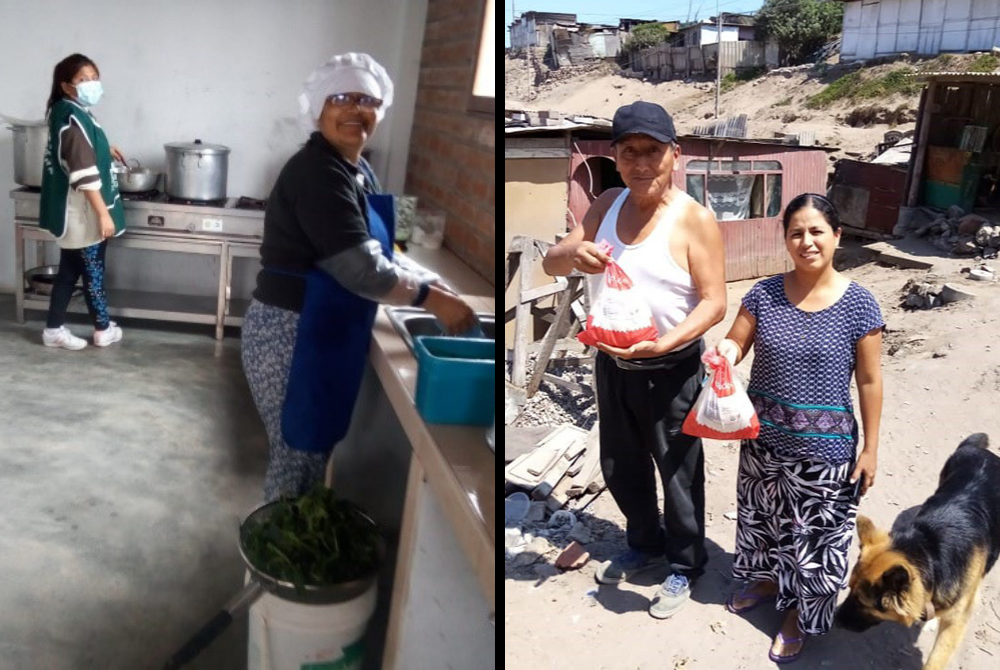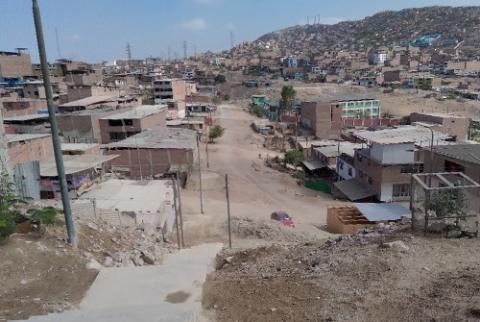
At left, women prepare meals for people in need in the convent kitchen of the Franciscan Missionaries of Mary; at right, a family receives food items during a lockdown for COVID-19. In an outlying area of Lima, Peru, sisters serve the population, which includes many migrants. Several families do not have enough food to eat daily. (Courtesy of Marian Champika Hanzege)
I live in an outlying area of Lima, Peru. The population is made up of migrants from the interior of the country, and they live mostly in the foothills of this marginal area. The women work in kitchens or laundries, or they clean houses in the city; men work as bricklayers, collectors, motorcycle taxi drivers, market vendors or street vendors.
The children go to school, but in the afternoons, they are abandoned at home alone since their parents work. Some young people work and study, but there are those who do not have those opportunities because of poverty or severe traumas resulting from family problems that lead some to drug addiction and/or crime. There are also several elderly people who live alone without the care of relatives.
One result of the poverty in which the families live in this area is that many families do not have enough to eat daily. Last year when COVID-19 struck, it was a sudden surprise that hit the residents of the country with all its consequences — the hunger, illness, lack of work and loss of loved ones in this pandemic paralyzed the entire country from one day to the next; it was a striking experience!

The sisters' neighborhood in an outlying area of Lima, Peru (Courtesy of Marian Champika Hanzege)
We live on top of a mountain, and from here we could see the city that looked like a ghost town. We Franciscan Missionaries of Mary can take advantage of these difficult times to be generators of life based on our charism. This crisis helped us to strengthen our bonds of fraternity, to broaden our hearts to accompany suffering humanity.
The community decided to transmit virtually from our chapel the liturgies, adoration of the Blessed Sacrament, and the holy rosary, so that our sisters and brothers would not lack the presence of God in these difficult moments. This time helped us to live in universal solidarity and share what we had in our home. In addition, the help we have received from our congregation has been a blessing, enabling us to show our solidarity with more vulnerable people, showing the compassionate face of God and bringing hope to people.
As I reflect on this, I want to be in union with the people who have suffered and succumbed to this disease … to those who have been most impacted by this global health crisis: people without work, young people who cannot continue their studies, and people who are starving in the middle of a very long confinement.
Jesus says in the Gospel: Because I was hungry, and you fed me; I was thirsty, and you gave me to drink; I was a foreigner, and you welcomed me (Matthew:25:35).
Advertisement
This is the propitious time that God gave us as baptized and consecrated persons to connect and to help with the emerging and suffering world. Our religious community has organized a dining room to share a lunch with people who do not have food for the day. Monday to Friday we prepare and deliver to the people who come to the door, thanks to a lady who helps us prepare the food.
This time was for me a call to live my commitments as a Franciscan Missionary of Mary with great intensity, in a new way. I took this moment as an opportunity to give life starting with the little things, accompanying the people not only by sharing food but also through virtual media in our pastoral work; the pandemic pushed us to use these means to carry out our mission and to be in contact with people. The aspects of our charism that seemed most outstanding were: offering, contemplation, compassion, closeness, sharing and unity among ourselves.
Our constitution says that we are called to read "the signs of the times" and commit ourselves to take risks to co-create a new world where there will be justice for all. God challenges us through our charism and the signs of the times; this is why we are attentive to the needs of a changing world and to the requests and needs of both the universal and our local Church.







